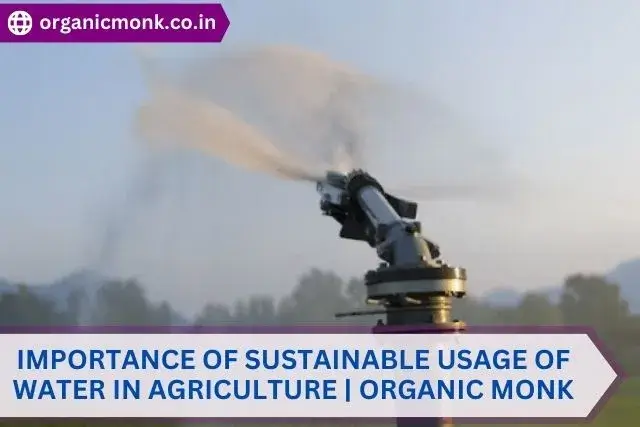Introduction
The water demand is enormous all over the world. According to studies, about 2 liters of water are required to meet the daily water needs of the human body. In total, a huge amount of about 3000 liters of water is consumed to meet the average human daily needs.
In agriculture, about 70% of fresh water is consumed directly or indirectly. With the consumption of this huge amount of water, the sustainability of farmlands and ecosystems is at risk. In addition, the growing demand for food for the huge population is pushing the limits of sustainable water use.
In this blog, we will talk about the importance of water in agriculture. And why the sustainable use of water in agriculture is so important.
Importance of water in agriculture
Water is crucial for agriculture as it is required for plant growth and survival. Agriculture is the largest consumer of water resources globally, accounting for around 70% of all freshwater withdrawals. Here are some of the key reasons why water is important in agriculture:
Plant Growth:
Water is essential for plant growth and development. Plants absorb water through their roots and use it to carry nutrients throughout their system. Without adequate water, plants cannot grow properly and may even die.
Crop Yield:
Water is necessary for producing healthy crops and high yields. Crops that receive adequate water produce more fruit, vegetables, and grains than those that are water-stressed.
Soil Moisture:
Water helps to maintain soil moisture, which is crucial for the survival of plants. Soil moisture also affects the texture of the soil, which in turn impacts the availability of nutrients to plants.
Irrigation:
Many farmers use irrigation to provide water to crops. Irrigation helps to ensure that crops receive the right amount of water, even during dry spells or droughts.
Livestock:
Water is also essential for raising livestock. Animals need water to drink and to keep cool in hot weather.
In short, water is a critical resource in agriculture that is necessary for the growth of plants and the production of food. Without adequate water, agriculture would not be possible, and the world would face significant food shortages.
Why is sustainable usage of water in agriculture important?
Sustainable usage of water in agriculture is important for several reasons:
Conservation of water resources:
Sustainable usage of water in agriculture helps to conserve water resources for future generations. By using water more efficiently, farmers can reduce the amount of water they need to produce crops and minimize the risk of water scarcity.
Environmental protection:
Excessive water use in agriculture can lead to the depletion of aquifers, degradation of water quality, and damage to ecosystems. Sustainable usage of water can help to protect the environment by reducing water waste and pollution.
Economic benefits:
Sustainable usage of water can also provide economic benefits to farmers and communities. By using water more efficiently, farmers can reduce their costs and increase their profits. This can also help to boost the local economy and create jobs.
Climate change:
Climate change is expected to have a significant impact on water availability for agriculture. Sustainable usage of water can help to mitigate the effects of climate change by reducing water demand and increasing water use efficiency.
Food security:
Sustainable usage of water is critical for ensuring food security. As the global population grows, the demand for food will increase, and sustainable water use will become even more important to meet this demand.
Methods for sustainable usage of water in agriculture
There are several methods for sustainable usage of water in agriculture:
Drip irrigation:
Drip irrigation is a method of providing water directly to the roots of plants through a network of pipes and emitters. This method can reduce water usage by up to 50% compared to traditional flood irrigation.
Conservation tillage:
Conservation tillage is a method of planting crops without disturbing the soil. This method can help to retain moisture in the soil, reduce erosion, and increase water infiltration.
Crop selection:
Choosing crops that are adapted to the local climate and soil conditions can help to reduce water usage. For example, drought-resistant crops require less water than crops that are not adapted to dry conditions.
Crop rotation:
Crop rotation is a method of planting different crops in the same field in successive seasons. This method can help to reduce soil erosion, improve soil health, and reduce water usage.
Rainwater harvesting:
Rainwater harvesting involves collecting and storing rainwater for later use. This method can help to reduce the demand for freshwater and provide a source of water for irrigation.
Soil moisture sensors:
Soil moisture sensors can help farmers to determine the moisture content of the soil and adjust their irrigation practices accordingly. This can help to reduce water waste and optimize crop growth.
Water reuse:
Water reuse involves treating wastewater and reusing it for irrigation. This method can help to reduce the demand for freshwater and minimize the impact of wastewater on the environment.
Conclusion
In summary, sustainable water use in agriculture is important to conserve water resources, protect the environment, achieve economic benefits, mitigate climate change, and ensure food security.
There are several methods for sustainable water use in agriculture. These include drip irrigation, conservation tillage, crop selection, crop rotation, rainwater harvesting, soil moisture sensors, and water reuse. By using these methods, farmers can reduce water consumption, conserve water resources, and protect the environment.

